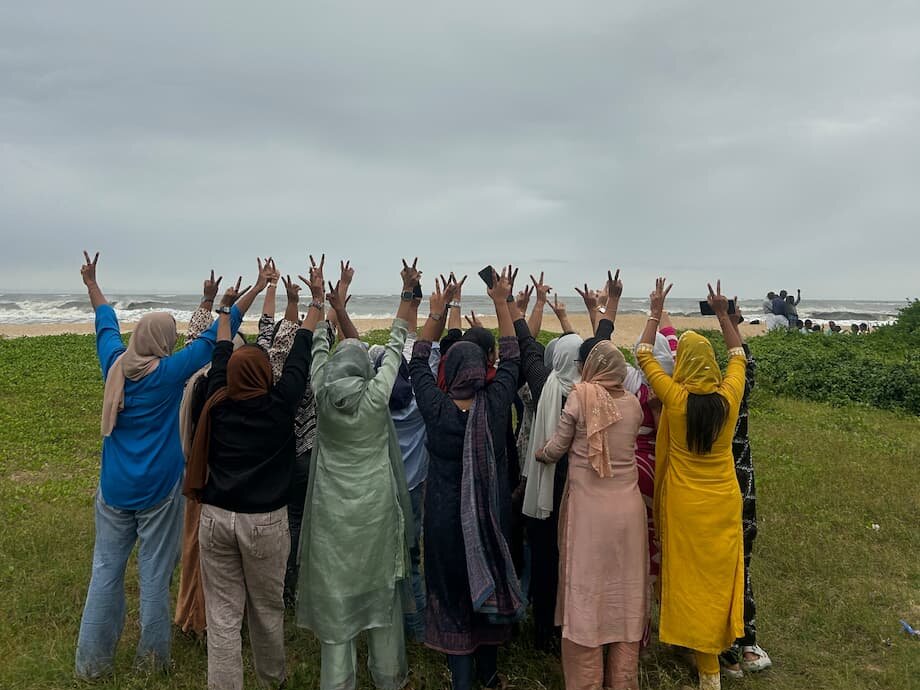Indian Divorce Retreats Challenge Stigma and Empower Women Across the Country
Nature-based healing camps in Kerala and beyond offer support, legal advice, and a sense of community to women facing marital breakdown.
In the rolling hills of Vagamon, Kerala, a group of 15 women—some in hijabs, others in colorful dupattas—sing together as they hike through tea plantations. Their laughter and voices echo across the landscape, marking a moment of freedom and solidarity. This gathering is not a typical vacation. It is India’s first “divorce camp,” a retreat designed to help women who are divorced, separated, widowed, or struggling in their marriages find healing, community, and empowerment in a society where marital breakdown is often met with stigma and silence.
- Indian Divorce Retreats Challenge Stigma and Empower Women Across the Country
- Why Divorce Remains Taboo for Indian Women
- Inside the Divorce Retreats: Healing, Support, and Legal Advice
- Societal Change: Challenging Patriarchy and Redefining Empowerment
- Legal and Social Challenges: Navigating Divorce in India
- Wellness, Travel, and the Rise of Women-Only Retreats
- Changing Narratives: Women Choosing Divorce and Redefining Agency
- Historical Context: Women’s Empowerment in India
- What to Know
The retreat, founded by Rafia Afi, is part of a growing movement to normalize divorce and support women in reclaiming their lives. Afi, inspired by her own experience of divorce and the isolation that followed, began sharing her journey online. She soon received messages from women across India who lacked support systems and faced judgment from families and communities. In response, she created Break Free Stories, a series of nature-themed divorce healing camps that have quickly gained popularity and are now expanding to other cities.
These retreats offer more than just a break from daily life. They provide a safe space for women to share their stories, participate in group activities, and access legal and financial advice. The goal is clear: to challenge the narrative that separation is shameful and to celebrate the courage it takes to leave an unhealthy marriage.
Why Divorce Remains Taboo for Indian Women
Divorce in India is still widely seen as a social taboo, especially for women. Traditional expectations often dictate that a woman’s ultimate achievement is marriage, and endurance in the face of hardship is considered honorable. This mindset has deep roots in patriarchal norms, where women are taught from childhood to prioritize family reputation and harmony over their own well-being.
According to a recent survey, 32% of married Indian women aged 18-49 have reported experiencing domestic violence. Despite legal protections, many women are pressured to remain in abusive marriages due to fear of social ostracism, financial insecurity, or concern for their children’s futures. The phrase “a divorced daughter is better than a dead daughter” has gained tragic relevance in recent years, following high-profile cases of dowry deaths and domestic abuse.
The stigma attached to divorce can be so severe that some women choose to endure violence rather than face the judgment and isolation that often follows separation. In some cases, families discourage divorce because it may require returning dowry payments or bring shame upon the household. This environment leaves many women feeling trapped and unsupported.
Rafia Afi’s divorce retreats directly confront these issues by offering women a chance to break free from toxic relationships and societal expectations. As Afi explains, “Leaving a bad marriage is not shameful—it’s courageous.”
Inside the Divorce Retreats: Healing, Support, and Legal Advice
The Break Free Stories camps are carefully designed to foster healing and empowerment. Each retreat brings together 15 to 20 women from diverse backgrounds for a weekend of activities that include hiking, dancing, music, storytelling, and open conversations. The natural setting of Kerala’s hills provides a tranquil backdrop for reflection and connection.
Participants describe the experience as transformative. Many arrive feeling isolated and burdened by shame, but leave with a renewed sense of self-worth and hope. The retreats emphasize the importance of community, encouraging women to support one another and share their journeys without fear of judgment.
Legal and financial independence are also key components of the program. Zaki J, a musician and lawyer who volunteers at the camps, offers legal advice to attendees, particularly those who have survived domestic violence. She helps women understand their rights, navigate the legal system, and access resources for financial independence. This practical support is crucial in a country where legal proceedings can be lengthy, complex, and intimidating.
Other activities focus on rebuilding confidence and setting new goals. Through games, group discussions, and creative exercises, women are encouraged to rediscover their strengths and envision a future beyond their marriages. The retreats also provide information on workplace rights and the Prevention of Sexual Harassment (PoSH) Act, empowering women to advocate for themselves in professional settings.
Juie Merchant, founder of Alpha Woman and a divorce healing coach, runs similar empowerment retreats for Indian women. Drawing from her own experiences of restrictive environments before and after marriage, Merchant emphasizes the importance of independence and self-confidence. Her programs offer tailored exercises to help women heal, set new goals, and overcome centuries-old social conditioning that prioritizes others over themselves.
Societal Change: Challenging Patriarchy and Redefining Empowerment
The rise of divorce retreats and empowerment programs reflects broader shifts in Indian society. While divorce remains stigmatized in many regions, there are signs of changing attitudes, particularly among younger generations and in states with higher levels of women’s education and economic participation.
Statistics show that states like Bengal, Kerala, and Maharashtra have higher rates of divorce and separation among women compared to more conservative regions such as Rajasthan, Uttar Pradesh, and Bihar. Sociologists attribute this pattern to greater empowerment and autonomy among women in these states. For example, in Bengal, 90% of women in the separated category are formally divorced, compared to 60-80% in other states. Activists point to the influence of cultural icons like the goddess Kali and literary works such as Tagore’s “Streer Patra” in shaping a tradition of female agency.
Despite these advances, many women across India still face significant barriers to independence. In places like Ladakh, women are often excluded from decision-making and entrepreneurship, and divorced women may be left to care for children without income or assets. Representation in local councils remains minimal, and traditional norms continue to limit women’s opportunities.
Financial independence is widely recognized as a key factor in women’s empowerment. Initiatives like skill development programs, entrepreneurship training, and women-only travel groups are helping to create new pathways for self-sufficiency. As Yangchan Dolma, vice-president of Women Alliance Leh, notes, “Financial independence is key to empowerment.”
Legal and Social Challenges: Navigating Divorce in India
The legal landscape for divorce in India is complex and often daunting. While laws exist to protect women from domestic violence and dowry harassment, the judicial process can be slow and unpredictable. Many women struggle to access legal help, especially when abandoned by husbands living abroad or facing financial hardship.
Cases of abandonment are particularly challenging. Thousands of Indian women have been deserted by spouses who live overseas, leaving them without financial support or legal recourse. The Indian government has taken steps to address this issue, such as publishing guidance on overseas marriages and approving a bill to make NRI marriage registration compulsory. However, enforcement remains inconsistent, and many women are left in limbo, unable to remarry or claim their rights.
At the same time, there is growing debate about the misuse of laws intended to protect women. Some men’s rights activists argue that legal provisions are sometimes exploited for personal gain, leading to false allegations and lengthy court battles. While data shows that women are more often victims of domestic violence and dowry-related abuse, concerns about fairness and due process persist. Legal experts call for reforms to ensure that justice is delivered efficiently and equitably for all parties.
The emotional toll of divorce proceedings can be severe, with both men and women experiencing mental health challenges. High-profile cases, such as the suicide of Atul Subhash in Bengaluru, have sparked national debates about gender relations, legal bias, and the need for gender-neutral laws. Scholars caution against generalizing from individual cases, emphasizing that systemic disadvantages faced by women remain a pressing concern.
Wellness, Travel, and the Rise of Women-Only Retreats
The popularity of divorce retreats is part of a larger trend in India: women are increasingly seeking wellness, healing, and empowerment through travel and community experiences. Eco-conscious and wellness trips have become the new “BFF getaways,” with women prioritizing self-care, sustainability, and connection over traditional tourism.
According to travel industry reports, over 70% of solo women travelers in India now prefer wellness or eco-conscious trips. Destinations like Sikkim’s zero-waste villages, Kerala’s Ayurvedic retreats, and women-only circuits in Spiti Valley are attracting urban millennials and Gen Z women seeking deeper rest and self-discovery. Many of these trips support local women through homestays, workshops, and skill development programs.
Social media has played a significant role in promoting these trends, with influencers sharing stories of empowerment and popular hashtags like #WanderGreen encouraging mindful travel. The future of women’s travel in India includes innovations such as solar-powered hostels, menstrual-friendly kits, and slow travel internships.
These experiences offer more than relaxation—they provide opportunities for women to build confidence, form supportive networks, and challenge traditional gender roles. As Juie Merchant of Alpha Woman observes, “Alpha Woman means freedom and independence, being bold enough to live life the way you want to.”
Changing Narratives: Women Choosing Divorce and Redefining Agency
Recent trends indicate that Indian women are increasingly taking the initiative to end unsatisfying or abusive marriages. Contrary to traditional beliefs that men control the terms of marriage and divorce, statistics show that women are more likely to initiate divorce. This shift reflects growing financial independence, changing societal norms, and a willingness among women to prioritize their own well-being.
Experts suggest that as women gain access to education, employment, and legal resources, they are better equipped to make choices about their lives. The rise of empowerment retreats, support groups, and online communities has helped to break the isolation that many women feel after divorce. These networks provide practical advice, emotional support, and a sense of belonging.
However, challenges remain. The stigma of divorce continues to affect women’s social standing, employment prospects, and family relationships. Many divorced women face ongoing scrutiny and are often seen as burdens rather than individuals with agency. Activists and community leaders stress the need for continued efforts to promote gender equality, financial independence, and legal reform.
Historical Context: Women’s Empowerment in India
The movement to empower divorced and separated women in India builds on a long history of female agency and activism. Figures like Kamaladevi Chattopadhyay, a freedom fighter and cultural icon, played a vital role in advancing women’s rights and economic independence. Kamaladevi’s work in reviving Indian handicrafts, theatre, and social institutions created opportunities for countless women to achieve self-sufficiency and self-expression.
Today’s divorce retreats and empowerment programs are part of this legacy, offering new models of support and solidarity. By challenging patriarchal norms and creating spaces for healing and growth, these initiatives are helping to reshape the narrative around divorce and women’s empowerment in India.
What to Know
- India’s first divorce retreat, founded by Rafia Afi in Kerala, offers healing, legal advice, and community support to women facing marital breakdown.
- Divorce remains heavily stigmatized for women in India, with many pressured to stay in abusive marriages due to social and financial concerns.
- Retreats like Break Free Stories and Alpha Woman focus on building confidence, legal awareness, and financial independence for participants.
- States with higher levels of women’s education and empowerment, such as Bengal and Kerala, report higher rates of divorce and separation.
- Legal challenges, including slow court processes and lack of support for abandoned wives, remain significant barriers to women’s independence.
- Women-only wellness and empowerment retreats are part of a broader trend of women seeking healing, self-care, and community through travel and shared experiences.
- Changing attitudes and increased agency among Indian women are challenging traditional gender roles and redefining the meaning of divorce and empowerment.












